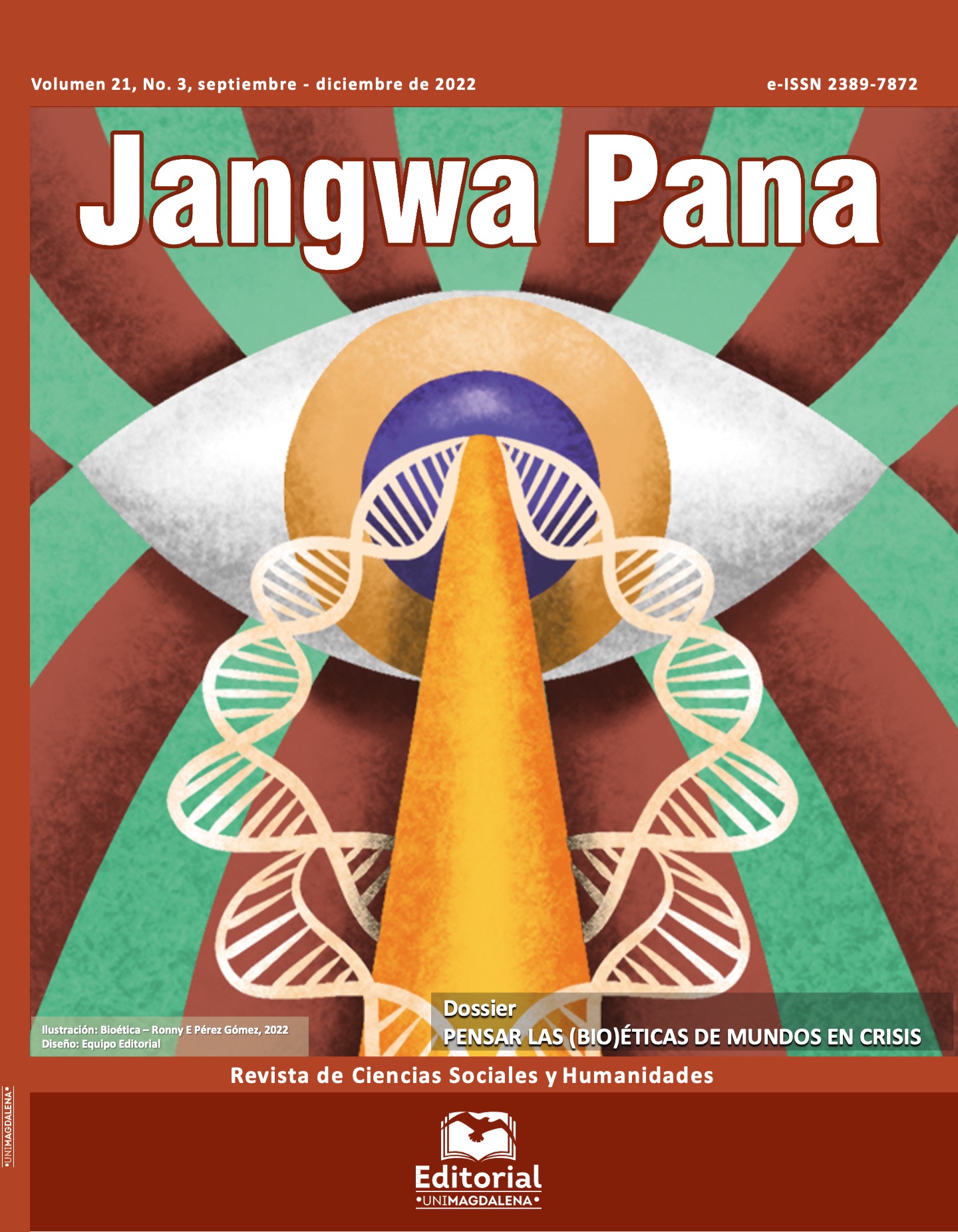Reflections on scientific fantasy and transhumanism based on the analysis of the stories El Psychon by Leopoldo Lugones and El Hombre artificial by Horacio Quiroga
Main Article Content
Abstract
Downloads
Article Details
References
Agulles, J. (2021). Comunidad, inmunidad y tecnología. Una aproximación crítica al transhumanismo. Argumentos de Razón Técnica (24), 92-115. http://doi.org/10.12795/Argumentos/2021.i24.04
Alva-Arroyo, N., Torres-García, R., Gasca-Aldama, J., y Carrillo-Esper, R. (2022). Transhumanismo. Medicina Interna de México, 38 (4), 741-751. https://doi.org/10.24245/mim.v38i4.7731
Amatto, A. (6 de septiembre de 2018). Frente a las puertas de lo irresoluble: la literatura fantástica. Este País: https://estepais.com/cultura/literatura/agosto-frente-a-las-puertas-de-lo-irresoluble-la-literatura-fantastica/
Amatto, A. (2020). Las fronteras de la ficción: cómo concebir los límites del relato fantástico-social en América Latina. Pirandante (5), 1-11. https://www.academia.edu/43948001/Las_fronteras_de_la_ficci%C3%B3n_c%C3%B3mo_concebir_los_l%C3%ADmites_del_relato_fant%C3%A1stico_social_en_Am%C3%A9rica_Latina
Arella, D. (Ed.). (2015). Relatos pioneros de la ciencia ficción latinoamericana. Fundación Editorial El Perro y la Rana.
Arias-Maldonado, M. (2019). Transhumanismo, posthumanismo, Antropoceno: notas sobre la humanidad vertiginosa. Pasajes (57), 29-36. https://roderic.uv.es/bitstream/handle/10550/73005/7134245.pdf?sequence=1
Asla, M. (2018). El transhumanismo (TH) como ideología. Ambigüedades y dificultades de la fe en el progreso. SCIO. Revista de Filosofía (15), 63-96.
Bauman, Z. (2005). Vidas desperdiciadas. La modernidad y sus parias. Paidós Ibérica.
Bustamante, T. (2010). El pensamiento sobre la naturaleza en el Renacimiento. Antropología. Cuadernos de Investigación (10), 61-73. https://doi.org/10.26807/ant.v0i10.48
Butler, J. (2009). Performatividad, precariedad y políticas sexuales. AIBR. Revista de Antropología Iberoamericana, 4 (3), 321-336. https://www.redalyc.org/pdf/623/62312914003.pdf
Campra, R. (2014). Territorios de la ficción: Lo fantástico. Editorial Renacimiento.
Canavera, J. (2022). El hombre aumentado, ¿última fase de la antropogenia neoliberal? Recerca. Revista de Pensament I Anàlisi, 27 (1), 1-24. http://dx.doi.org/10.6035/recerca.5772
Cano, L. (2005). El hombre artificial de Horario Quiroga y los comienzos de la ciencia ficción hispanoamericana. Miflc Review, 11, 99-111. http://miflc.com/wp-content/uploads/2020/05/Cano-Volume-11.pdf
Chaves, J. (1996). Magia y ocultimos en el siglo XIX. Acta Poética, 17 (1-2), 291-327. http://dx.doi.org/10.19130/iifl.ap.1996.1-2.551
Chaves, J. (2008). El ocultismo y su expresión romántica. Acta Poética, 29 (2), 101-114. http://dx.doi.org/10.19130/iifl.ap.2008.2.259
Cortina, A. (2022). Pensamiento, 78 (298), 471-483. https://doi.org/10.14422/pen.v78.i298.y2022.009
Diéguez, A. (2020). La función ideológica del transhumanismo y algunos de sus presupuestos. Isegoría (63), 367-386. https://doi.org/10.3989/isegoria.2020.063.05
Dussel, E. (2008). Meditaciones anti-cartesianas: sobre el origen del anti-discurso filosófico de la modernidad. Tabula Rasa (9), 153-197. https://doi.org/10.25058/20112742.344
García, F. (1999). El cyborg como reconstrucción del agente social. Política y Sociedad (30), 165-192. https://revistas.ucm.es/index.php/POSO/article/view/POSO9999130165A/24884
Griffiths, D. (2015). Queer Theory for Lichens. UnderCurrents (19), 36-45. https://currents.journals.yorku.ca/index.php/currents/article/view/40249
Haraway, D. (1991). Ciencia, cyborgs y mujeres. La reinvención de la naturaleza. Ediciones Cátedra.
Haraway, D. (2008). When Species Meet. University of Minnesota Press.
Haraway, D. (2020). Seguir con el problema: Generar parentesco en el Chthuluceno. Consonni.
López, L. (2008). Radiografía del fantasma: orígenes de la ciencia-ficción y el cuento fantástico en Argentina. En T. López-Pellisa, y F. Ángel-Moreno, Ensayos sobre ciencia ficción y literatura fantástica (242-255). Universidad Carlos III. https://dialnet.unirioja.es/servlet/articulo?codigo=4606817
Ludmer, J. (1999). El cuerpo del delito. Un manual. Libros Perfil S. A.
Lugones, L. (1906). El psychon. En L. Lugones, Las fuerzas extrañas. Cuentos fatales (181-199). Arnoldo Moen y Hermano Editores.
Lugones, L. (1906). Las fuerzas extrañas. Cuentos fatales. Arnoldo Moen y Hermano Editores.
Miranda, J. (1979). Antología: Ciencia-Ficción Venezolana. El Diario de Caracas.
Oparin, A. (2006). El origen de la vida. Ediciones Leyenda y México.
Perea-Siller, F. (2004). Ciencia y ocultismo en el primer Lugones: Cuatro cuentos. Alfinge (16), 241-252. https://dialnet.unirioja.es/servlet/articulo?codigo=1034116
Preciado, P. (2008). Testo Yonqui. Sexo, drogas y biopolítica. Anagrama.
Quereilhac, S. (2008). El intelectual teósofo. La actuación de Leopoldo Lugones en la revista Philadelphia (1898-1902) y las matrices ocultistas de sus ensayos del Centenario. Prismas, 12 (1), 67-86. https://prismas.unq.edu.ar/OJS/index.php/Prismas/article/view/Quereilhac_prismas12
Quereilhac, S. (2010). La imaginación científica: Ciencias ocultas y literatura fantástica en el Buenos Aires de entre-siglos (1875-1910) [Tesis doctoral]. Universidad de Buenos Aires: http://repositorio.filo.uba.ar/handle/filodigital/1604
Quereilhac, S. (2015). Reflexiones sobre una sensibilidad de época. La imaginación científica en la literatura y el periodismo (1896-1910). Badebec, 4 (8), 32-59. https://badebec.unr.edu.ar/index.php/badebec/article/view/121
Quiroga, H. (2015). El hombre artificial. En D. Arella (Ed.), Relatos pioneros de la ciencia ficción latinoamericana (123-162). Fundación Editorial El Perro y la Rana.
Ramalle, E. (2007). Frankenstein, un espejo de la identidad humana. Berceo (153), 81-96. https://dialnet.unirioja.es/servlet/articulo?codigo=2667997
Ravasi, G. (2022). Una mirada panorámica y simbólica sobre el transhumanismo. Pensamiento, 78 (298), 461-470. https://doi.org/10.14422/pen.v78.i298.y2022.008
Santamaría, L. (2020). Intertextualidades siniestras entre la literatura y el cine. Científicos locos, femmes fatales, doppelgängers y mutilaciones corporales. Tropelías (34), 152-181. https://papiro.unizar.es/ojs/index.php/tropelias/article/view/4369
Shelley, M. (1972). Frankenstein o el moderno Prometeo. Centro Editor de América Latina.
Suárez-Ruiz, E. (2021). ¿Transhumanismo predarwiniano? Normatividad fuerte y débil en la perspectiva transhumanista. Logos. Anales del Seminario de Metafísica, 54 (2), 555-557. https://doi.org/10.5209/asem.72686
Sundberg, J. (2011). Diabolic Caminos in the Desert and Cat Fights on the Río: A Posthumanist Political Ecology of Boundary Enforcement in the United States-Mexico Borderlands. Annals of the Association of American Geographers, 101 (2), 318-336. http://dx.doi.org/10.1080/00045608.2010.538323
Svampa, M. (2018). Imágenes del fin. Narrativas de la crisis socioecológica en el Antropoceno. Nueva Sociedad (278), 151-164. https://static.nuso.org/media/articles/downloads/EN_Svampa_278.pdf
Trischler, H. (2017). El Antropoceno, ¿un concepto geológico o cultural, o ambos? Desacatos (54), 40-57. https://doi.org/10.29340/54.1739
Ulloa, A. (2017). Dinámicas ambientales y extractivas en el siglo XXI: ¿es la época del Antropoceno o del Capitaloceno en Latinoamérica? Desacatos (54), 58-73. https://doi.org/10.29340/54.1740
Vega, R., y Ortiz, G. (2021). Posturas y presuposiciones éticas en el debate por el uso de animales no humanos en investigación científica. Revista de Bioética y Derecho (51), 21-42. https://scielo.isciii.es/pdf/bioetica/n51/1886-5887-bioetica-51-00021.pdf
Wallerstein, I. (2001). Conocer el mundo, saber el mundo: El fin de lo aprendido, Una ciencia social para el siglo XXI. Siglo XXI Editores.
Winner, L. (1980). Do Artifacts Have Politics? Daedalus, 109 (1), 121-136. http://www.jstor.org/stable/20024652

